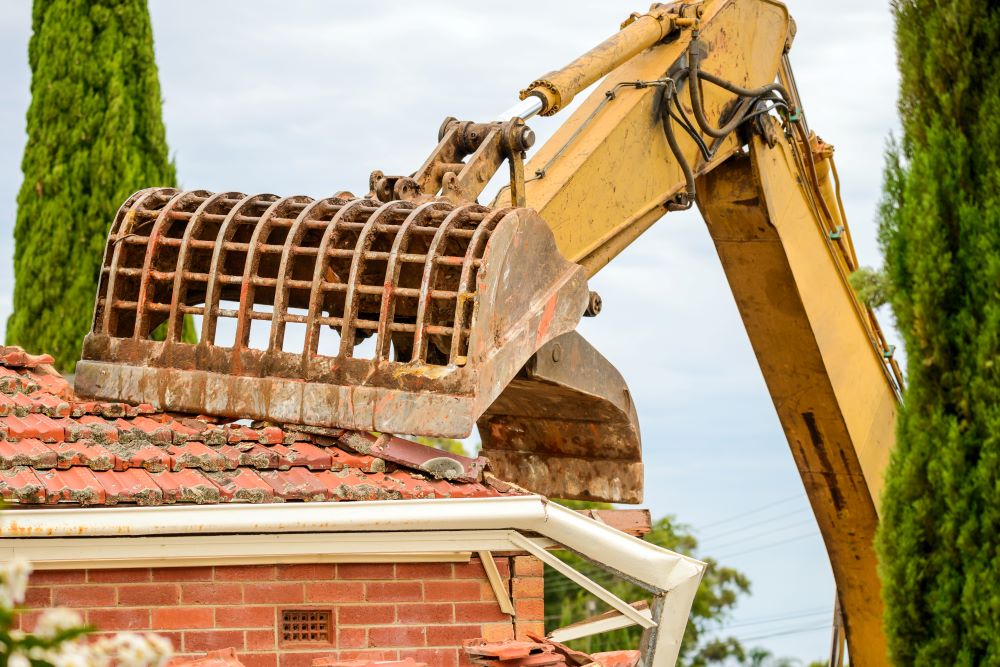
What You Need to Know: Residential Demolition Services
Do you want to demolish a house, but you’re not sure where to begin? There’s nowhere else to look! We will cover all the important information you need to understand home demolition services in this post. It is crucial to comprehend the procedure, associated expenses, and ecological consequences of demolishing a property.
We at Maxton Demo take great satisfaction in our dedication to sustainability. Our processes put an emphasis on material salvage and recycling, which lowers waste and carbon emissions. Regardless of the size of the residential complex you’re trying to demolish, we have the know-how and equipment to do the job quickly and efficiently.
OUR SERVICES
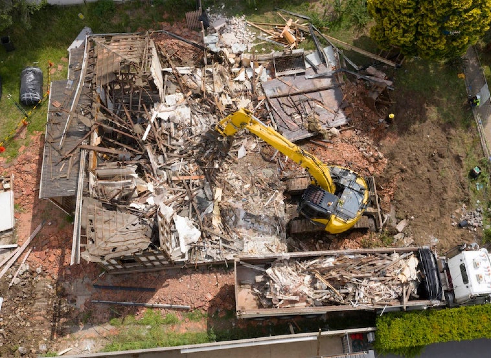
Structure Demolition. Residential, Commercial & Industrial
If your structure poses a health, safety, or environmental risk, demolition can prevent costly citations or fatal accidents. While this may seem daunting, you are just a phone call away from having your residential demolition done professionally, responsibly, and at a great price.
Talk to a Demolition Specialist Now! 916.249.5001
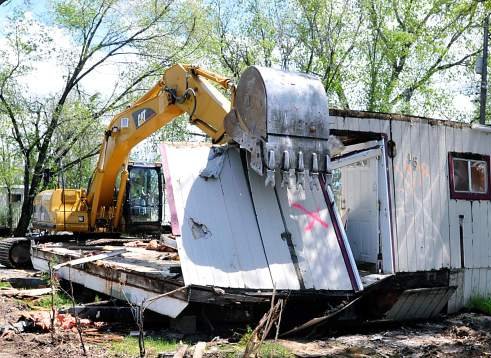
Mobile Home Demolition
We demolish and haul away mobile homes. Any size, anywhere, anyhow. We are fast, clean and competitive. We serve most of Northern California. There are many factors to consider when removing or demolishing your old trailer, mobile home, or manufactured home like: the processes involved, costs, time, contractors, debris, and permits.
Talk to a Demolition Specialist Now! 916.249.5001
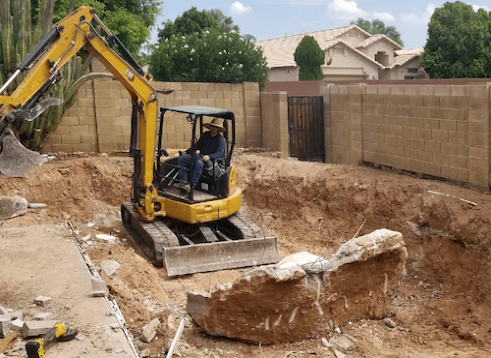
Pool Demolition
When removing a pool in Sacramento, California with the professional demolition team of Maxton Demo, you’re guaranteed peace of mind from beginning to end. From your initial request for an estimate to clean-up, you can expect our pool demolition process that’s completely professional and safe.
Talk to a Demolition Specialist Now! 916.249.5001
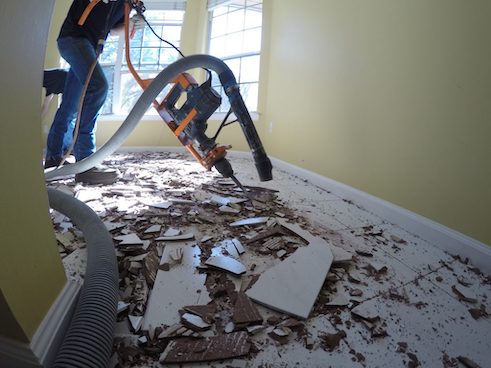
Floor Demolition
Flooring demolition, like any other major home renovation work, requires a specific set of skills and tools to be performed properly. You need experts in flooring demolition to get you the best floors possible. Contact us to find out more about how we can help you today.
Talk to a Demolition Specialist Now! 916.249.5001
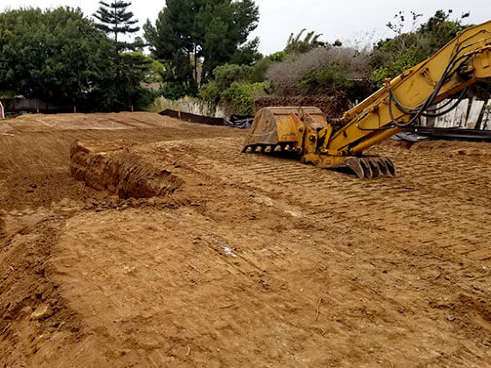
Grading & Excavating
If you need an experienced excavator and grader in Sacramento, call us today. One of the many reasons that residential, commercial, and industrial customers choose to work with us is because we’re able to provide a broad range of services to help construction-related projects get done in less time and at a reduced cost.
Talk to a Demolition Specialist Now! 916.249.5001

Roof Snow Removal
Heavy snow & ice dams can cause significant roof and home damage. Roof Snow removal is our specialty during the winter months. Serving the Sacramento, California area for 10 years, we can get your roof snow removed and promise a quick response and reasonable rates.
Talk to a Demolition Specialist Now! 916.249.5001
Motives behind Residential Demolition
There are many reasons why there may be residential demolition projects. The need for renovation is one such explanation. It could be necessary to demolish older buildings to create room for new ones when communities and urban environments change.
Residential demolition is often required when natural catastrophes like fires, floods, or earthquakes cause significant damage to a home. Sometimes homeowners decide to tear down their houses and replace them with more contemporary, useful properties. There may be asbestos present in the flooring, roofing, or insulation of older homes constructed before the 1980s. Because asbestos presents serious health risks, getting rid of it is essential to protecting both the environment and the occupants. Professionals in demolition have the skills and understanding necessary to handle hazardous materials in a responsible and safe manner.
Residential Demolition Method Types
Depending on the particular needs of the project, many techniques are used for residential demolition. Let’s examine a few typical home demolition techniques:
Selective demolition: This technique entails removing certain components of a building with care while leaving other sections intact. When repairing or restoring a house, selective demolition is often used since it preserves important components like historic features or structural parts.
Mechanical destruction: The most popular technique for demolishing homes is mechanical destruction. To demolish the structure, large equipment including cranes, bulldozers, and excavators are used. To make the demolition process easier, the equipment is fitted with specialized accessories like hydraulic breakers and shears.
Implosion: For high-rise buildings or other structures in heavily populated regions, implosion is a controlled destruction method. The method is the deliberate placement of explosives at critical structural locations to bring down the structure in a controlled manner. To protect neighboring buildings and lessen the effect on the environment, implosion needs careful preparation and collaboration.
Licenses and Rules for the Demolition of Residential Buildings
Understanding the necessary permissions and laws is essential before starting any home demolition work. Demolition permits are often necessary to guarantee compliance with local building laws and safety norms. These permits specify the project’s particular needs and may contain clauses pertaining to environmental preservation, waste management, and noise abatement.
You will have to provide the local authorities with comprehensive blueprints and supporting paperwork in order to get the required permissions. Architectural designs, structural evaluations, and environmental impact analyses may be examples of this.
Hiring a respectable demolition contractor that is conversant with the rules in the area will expedite the application process and guarantee that all specifications are met.
It is crucial to take into account any extra laws that can be relevant to your home demolition project in addition to permits. These might include rules for following environmental laws, protecting nearby properties, or disposing of dangerous waste.
You can manage these rules and guarantee a seamless and legal demolition operation by working with an expert demolition contractor.
Selecting a Contractor for Residential Demolition
For your project to succeed, choosing the best home demolition contractor is essential. Take into account the following aspects while selecting a contractor:
expertise and expertise: Seek a contractor with a great deal of prior home demolition expertise. They should have the know-how to tackle the unique difficulties of your demolition and a history of effectively finishing jobs of a similar kind.
Reputation and References: Find out how well-known the contractor is in the field. Check online reviews and get recommendations from past customers. Reputable contractors have good reviews and are eager to give references to show off their qualifications.
Licenses and Insurance: Verify that the contractor is in possession of the required licenses and insurance. Liability and workers’ compensation insurance are included in this. Checking these credentials will shield you from all possible responsibilities while the demolition is underway.
Environmental Procedures: Find out what environmental procedures the contractor follows. Reusing and recycling materials will be given first priority by a conscientious contractor in order to cut down on waste and lessen the project’s environmental effect. To determine their level of dedication to sustainability, find out about their recycling and waste management practices.
Invite the prospective contractors you’ve narrowed down to the site so they may submit comprehensive project bids. Consider variables like budget, schedule, and the contractor’s capacity to fulfill your particular needs when assessing these offers. Selecting the proper contractor is essential to a successful and trouble-free house demolition job.
The Procedure for Residential Demolition
To guarantee a safe and effective demolition, there are a few crucial elements in the home demolition process that must be followed. Let’s examine each phase of the procedure in more detail:
Initial Assessment: Examining the property in depth is the initial stage. This entails locating any potentially dangerous elements, evaluating the integrity of the structure, and selecting the most appropriate demolition technique given the particulars of the property.
Getting permissions: As was already noted, getting the required permissions is essential before starting any demolition work. This entails presenting thorough plans and supporting materials to the appropriate authorities and getting their approval.
Disconnecting services: All services, including gas, water, and electricity, must be cut off before demolition may start. By doing this, the demolition team’s safety is guaranteed, and any harm to the nearby infrastructure is avoided.
Asbestos Removal: If asbestos is present on the property, it has to be securely removed by qualified experts. Because asbestos removal poses a health concern, it is a highly regulated operation. Techniques for proper containment and disposal are used to stop asbestos fibers from spreading.
Structural Demolition: After making all the required arrangements, the demolition procedure itself starts. This entails using the selected demolition technique to bring the building down. For safe and controlled demolition, specialized tools and methods are used.
Waste Removal and Recycling: It is important to appropriately handle the debris and waste materials left behind after the building is destroyed. When it comes to trash management, demolition contractors have to have a strategy that puts recycling and material salvage first.
Site cleanup and restoration: Following the removal of the debris, the area is cleared of any risks and given a thorough cleaning. This might include backfilling any excavations, grading the soil, and making sure the location is secure and prepared for development in the future.
Precautionary Steps for Residential Demolition
When it comes to home demolition operations, safety is paramount. Demolition sites may be dangerous places; therefore, it’s important to follow proper safety procedures. The following are some essential safety precautions that need to be taken:
Personal Protective Equipment (PPE): Hard helmets, safety goggles, gloves, and steel-toed boots are among the PPE that all personnel engaged in the demolition process should wear. They are shielded from potentially dangerous objects, falling debris, and other dangers by this.
Site security and signage: In order to prevent unwanted entry, demolition sites need to be appropriately protected. It is important to post conspicuous signs to warn individuals of possible hazards and designate restricted areas.
Structural Stability Assessment: To detect any possible hazards, the stability of the structure should be evaluated prior to destruction. In order to avoid collapse during demolition, weak or unstable parts should be strengthened or eliminated.
Dust control: There might be a lot of dust produced during demolition, which is dangerous to breathe in. To reduce the amount of dust in the air, dust suppression devices or water spraying should be used as dust management techniques.
Control of Noise: Construction sites may be loud, which might annoy nearby homes. Using noise barriers or planning work for suitable hours are two examples of noise control strategies that can reduce the effect on the neighborhood.
Correct Equipment Operation: To ensure the machinery is operated safely, operators of demolition equipment need to be certified and trained. To guarantee peak performance and avoid mishaps, routine equipment maintenance and inspection are also crucial.
Residential demolition projects may be completed with little harm to the environment, surrounding people, or workers by following these safety precautions.
Environmental Factors in the Demolition of Residential Buildings
If residential demolition is not done properly, it may have a major negative influence on the environment. Throughout the demolition process, environmental considerations must be kept in mind. Here are some crucial things to remember:
Hazardous Material Management: As was previously indicated, older buildings may include lead-based paint or asbestos. It is essential to handle, remove, and dispose of these items properly to avoid contaminating the environment and endangering human health.
garbage management and recycling: There is a significant quantity of garbage produced during demolition. Waste management and recycling should be given top priority by demolition companies in order to reduce their negative environmental effects. Reusing materials and recycling building debris both lower landfill waste and promote sustainability.
Protection of Soil and Water: Demolition sites must take precautions to prevent pollution of the surrounding soil and water sources. This might include putting sediment management techniques into place, stopping the discharge of pollutants into stormwater drains, and using erosion control measures.
Energy Efficiency: Using energy-efficient techniques during demolition may provide a chance. Reusing salvaged materials with good insulating qualities, for instance, may cut down on the amount of new materials needed for building projects down the road and save energy.
Tree Preservation: Precautions should be taken to save and preserve any trees that may be affected by the demolition process. In addition to providing habitat for animals and sequestering carbon dioxide, trees provide many other environmental advantages. Every effort should be taken to preserve and safeguard the site’s existing trees.
Residential demolition projects may reduce their ecological impact and promote sustainable development by taking certain environmental concerns into account.
What Kind of Services Are Provided for Residential Demolition?
It is essential to comprehend what home demolition services include before moving further. Whether you’re demolishing a garage, an old home, or any other building, it’s imperative that you hire experts to make sure everything goes smoothly and safely.
Getting ready for the destruction of a house
In order to guarantee a smooth and successful project, enough planning must be done before starting a home demolition project. Here are some crucial actions to think about:
Getting the required permissions: Local governments often demand permits for demolition operations. These permits guarantee that the demolition process complies with safety standards and doesn’t endanger the environment or public health. It’s crucial to do your homework and get the necessary licenses before beginning the job.
Hazardous material evaluation and removal: Prior to demolition, it is crucial to evaluate and carefully remove any hazardous materials that may be present on the property, such as mold, asbestos, or lead-based paint.
Employing experts in the disposal of hazardous materials guarantees legal compliance and reduces health hazards.
Disconnecting utilities: All services, including gas, water, and electricity, must be correctly disconnected before demolition may start. By doing this, the demolition team’s safety is guaranteed, and any harm to the nearby infrastructure is avoided.
Demolition sites may be dangerous places; therefore, it’s critical to protect the area to keep anyone from entering without permission. People may be kept out of the danger zone by erecting warning signs and fencing off the area.
Notifying the neighborhood: Giving neighbors advance notice of the impending demolition project is a thoughtful move. By doing this, they can minimize any difficulty brought on by dust, noise, or temporary road closures and make the required plans.
Tools and methods used in residential demolition
For safe and effective structural removal, residential demolition calls for certain tools and methods. Here are a few tools and methods that are often used:
Excavators: Often employed in residential demolition, excavators are multipurpose machinery. They are capable of doing excavation work, clearing waste, and demolishing buildings. Hydraulic attachments on excavators, such as hammers, grapples, and shears, allow them to break down steel, concrete, and other materials with ease.
Large, weighty steel balls hung from cranes or excavators are known as wrecking balls. By swinging and hitting the structure, they are efficient at tearing down bigger buildings. To achieve accurate and controlled destruction, wrecking balls need to be operated by competent personnel.
Excavators with a high reach: Also referred to as long-reach excavators, high-reach excavators are designed especially for tearing down towering buildings. These robots can reach greater elevations while still being stable and under control because of their extended arms. Excavators with extended reach are often used in the demolition of buildings that have many stories or restricted access.
Techniques for selective demolition: These methods are used when certain components or materials must be eliminated without causing harm to the nearby building. These methods include manual disassembling, concrete bursting, and saw cutting.
Implosion: For large-scale demolitions, implosion is a controlled demolition method. In order to induce the building to fall inward, explosives must be placed strategically inside it. Careful preparation and cooperation are necessary for explosions to protect neighboring buildings and reduce environmental damage.
Aspects of cost related to residential demolition
Residential demolition costs might vary based on a number of variables. The following are some important cost factors:
Size and complexity of the structure: Larger or more intricately designed buildings may cost more to destroy since they take more time and effort.
Location: Depending on where the property is located, demolition expenses may change. The total cost may vary depending on elements including disposal costs, local laws, and accessibility.
Hazardous material removal: The whole cost of demolition will increase if there are hazardous materials on the site. These costs will be assessed and removed.
Site conditions: The state of the site, particularly the existence of rocks, trees, or other obstructions, may have an impact on the price and duration of the demolition process. It can need extra tools or methods to get beyond these obstacles.
Waste disposal: If there are certain laws or recycling standards in place, properly disposing of demolition waste may result in extra expenses.
It is recommended to evaluate the prices and services provided by obtaining numerous estimates from trustworthy demolition firms. Selecting the lowest price doesn’t necessarily mean that the highest standards of quality or safety are met.
Concluding remarks
Residential demolition is a difficult procedure that has to be planned carefully, done by experts, and done in accordance with environmental and safety regulations.
Making educated judgments and achieving a successful project require knowing what home demolition services offer. Every stage of the procedure, from evaluating the property and securing the required licenses to carrying out the demolition and handling the trash, is essential to the whole.
Give preference to businesses that have a track record of excellence in environmental compliance, efficiency, and safety when choosing a home demolition service.
Seek out seasoned experts who can manage the particular needs of your project, regardless of whether it involves selective, partial, or whole demolition. You can securely and effectively change your home to make room for new beginnings by selecting the best demolition service.
Do you have a Question?
Talk to a Demolition Specialist Now! 916.249.5001
Request Formal Quote